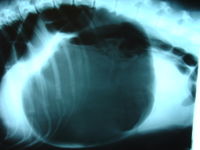
Photo from wikipedia
BACKGROUND The aim of the present study was to examine the clinical characteristics of hepatoid adenocarcinoma of the stomach (HAS) and its diagnosis, treatment, and prognosis. CASE SUMMARY A retrospective… Click to show full abstract
BACKGROUND The aim of the present study was to examine the clinical characteristics of hepatoid adenocarcinoma of the stomach (HAS) and its diagnosis, treatment, and prognosis. CASE SUMMARY A retrospective analysis of 13 HAS cases was performed. The mean age of the 13 patients was 66.08 years, and 10 of the 13 patients were male. Prior to treatment, the alpha-fetoprotein levels in the serum were elevated in 7 patients, the tumour was located in the distal or gastric body in 11 patients, and the gastroscopy pathological results showed that 3 patients had poorly differentiated tumours and that 8 patients had moderately/poorly differentiated tumours. Abdominal CT scans showed local stomach wall thickening, and enlarged lymph nodes were visible around the stomach in 8 patients. Of the 13 patients, 11 underwent radical surgery. The clinical pathological staging was as follows: Stage II in 2 cases; stage III in 8 cases; and stage IV in 1 case. A total of 3 patients were lost to follow-up. Otherwise, as of the last follow-up, 3 patients had survived for 56 mo, and the other 7 patients failed to achieve long-term survival (survival period of 1-56 mo). CONCLUSION HAS is a special type of gastric cancer, and the prognosis of HAS has improved compared with past prognoses. Measurement of alpha-fetoprotein, early diagnosis, active surgical treatment, and application of new diagnostic and treatment techniques are conducive to improving the prognosis of HAS.
Journal Title: World Journal of Clinical Cases
Year Published: 2020
Link to full text (if available)
Share on Social Media: Sign Up to like & get
recommendations!